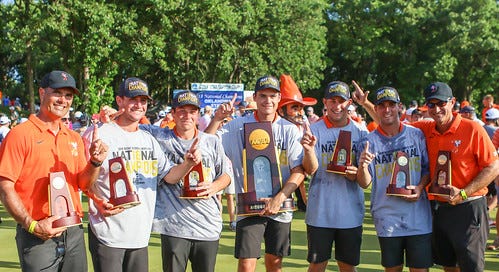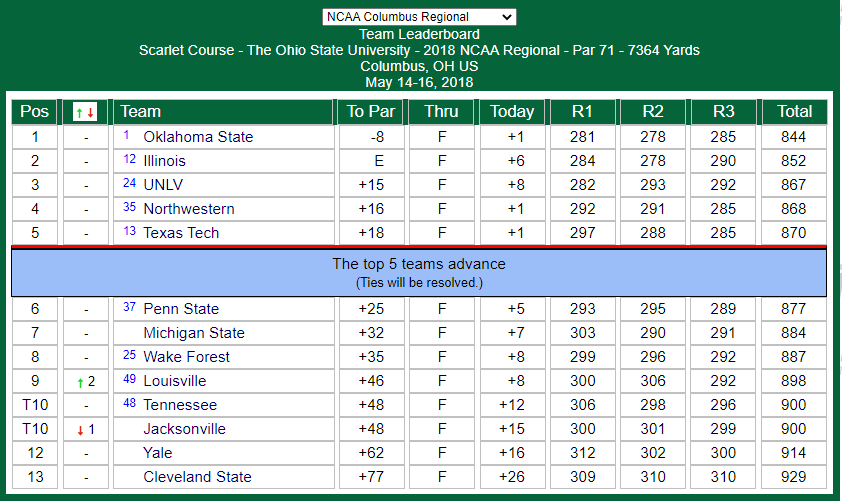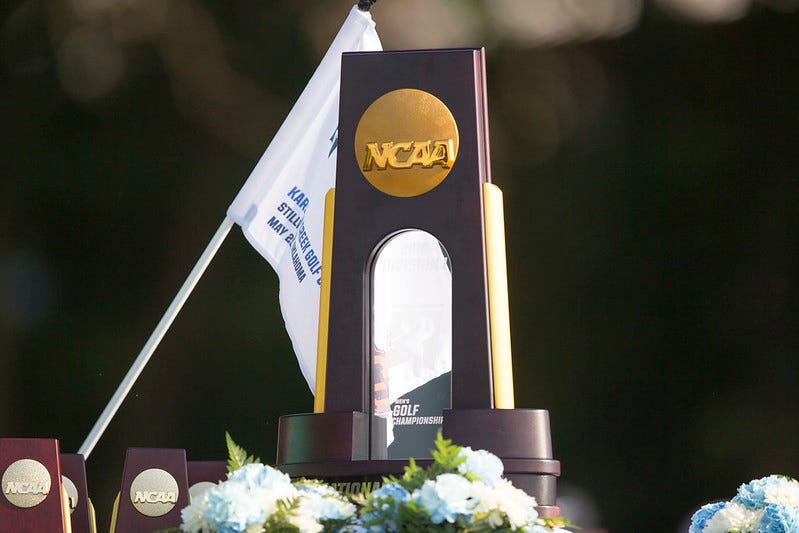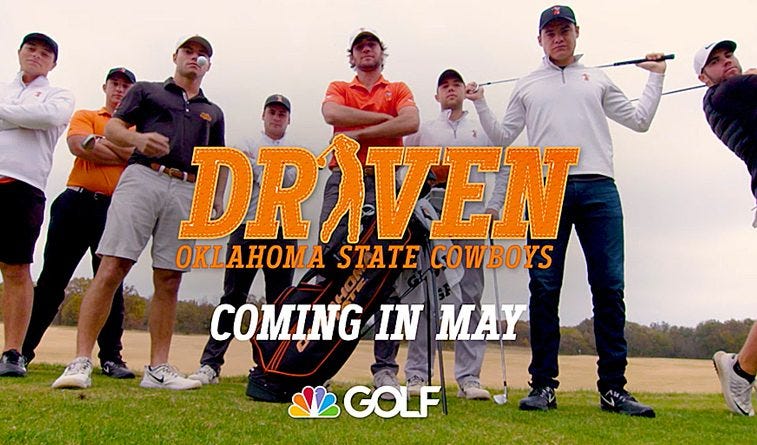This is part of a series on the Men’s Collegiate Championships
NCAA Championship Era: 1939-NOW
REGIONAL ROUND-UP
All of the Regional details including seeding for the teams and individuals can be found on the NCAA website here.
You can also watch the Golf Channel selection show replay here.
COLLEGE STATION REGIONAL
All chalk with the top teams almost finishing in order as the Aggies took care of business at home.
COLUMBUS REGIONAL
More chalk as the top seeds rode out the higher scores to punch their ticket to nationals. Oklahoma State won their 3rd straight Regional, the second time they had accomplished the feat (2009-11).
NORMAN REGIONAL
BYU and UNF just about spoiled Oklahoma’s home festivities, but in the end the 1 seed came through for the expected victory. The 3 seed Arkansas shot the second best score of the day to overtake the 4 seed Florida State for the final ticket to the NCAA championship.
RALEIGH REGIONAL
Not one but two of the top seeds failed to advance, making it the first time in Regionals history that both the 1 and 2 seeds from the same regional were sent home. The 3 seed, Texas, shot the third lowest team total in Regional history.
PACIFIC REGIONAL
Top seeded LSU became the second 1 seed this year to return home without a ticket to the national title. This was the first time that fewer than 5 of the 1 seeds would compete for the national championship since Regionals started in 1989. For just the second time since 2009, an 8 seed won their Regional.
KISSIMMEE REGIONAL
Weather couldn’t keep 2 seeded Florida from flirting with history, shooting the fourth lowest team total relative to par. UCF made the most of their hosting responsibilities by finishing second, the best showing for a 10 seed since the Regional format change in 2009.
Intercollegiate Championship #121: May 25-30, 2018
Host: Karsten Creek (Oklahoma State)
Any time the course name becomes a verb - as in, “I got Karsten Creeked today” - you know you have something special. Oklahoma State’s famously difficult home course has become one of the most iconic in the world of collegiate golf. Prior to the NCAA championships (both men’s an women’s) in 2018, Karsten Creek had hosted two other championships in 2003 and 2011, as well as three Regionals (2001, 2009, and 2016). In all of those cases, the winning teams had posted scores on the wrong side of par. In the first championship, 2003, the Clemson Tigers took home the NCAA championship trophy with a whopping four-round 1191 total (+39), just two strokes ahead of the host team. In 2011, UCLA earned the 1 seed in the match play portion after shooting a three-round total of 872 (+8) while Oklahoma State, 7 strokes behind, earned the 3 seed. Combined with the unpredictable Oklahoma weather that often produced sporadic high winds, many expected more of the same for the 2018. Although the final scores were rather predictable, the multiple broken scoring records on the way to those scores were not, and there were more people than ever tuning in to watch history being made.
Format
Team and Individual stroke play
Day 1 (Friday) = 18 holes
Day 2 (Saturday) = 18 holes
Day 3 (Sunday) = 18 holes
**Cut to top 15 teams
Day 4 (Monday) = 18 holes
**72 holes determines Individual championship
**Cut to top 8 teams
Team match play
Day 4 (Tuesday) = 2 matches
Quarterfinals
Semifinals
Day 5 (Wednesday) = Finals
Results
Individual Medalist/Champ: Broc Everett [Augusta]
The individual title seemed to be Bryson Nimmer’s [Clemson] for the taking. Nimmer had blistered the course with a first round 64 that not only put him as the early leader, but also broke the record for lowest round at Karsten Creek shot during an NCAA championship - bettering 2011 individual winner John Peterson’s 65. Even the second round 75 didn’t put Nimmer out of the running as he was able to bounce back with a third round 68 which put him at 9-under, two shots clear of Brandon Mancheno [Auburn]. It turns that that an even par round would have won Nimmer the title, however his fourth round proved to be a struggle like the second round, playing his way out of the individual race early. Mancheno, the SEC freshman of the year, played steady golf throughout that final round, getting back to even par with a birdie on the par 5 18th hole to not only hold the lead in the clubhouse but also set the Karsten Creek 72-hole scoring record at 281 - bettering Alejandro Canizares’s 287 from 2003. Mancheno got to wait and watch as chasers such as Doug Ghim - the Ben Hogan Award winner from Texas - and Ivan Ramirez [Texas Tech] came up just short of reaching his mark. Playing in the final group (off the front 9) with the #1 player in the field, Norman Xiong [Oregon], Augusta’s Broc Everett had taken the lead with a birdie on the 14th hole, but had given it right back with a bogey on the 15th. Pars and 16 and 17 meant that he came to par 5 18th - playing as the easiest hole for the tournament that had already yielded 39 birdies and 4 eagles on the day - with a chance to take the victory. With a healthy sized crowd watching him, the Augusta senior who had yet to win a collegiate tournament had a textbook par 5 play: fairway, lay-up, and stick it to ~10 feet for birdie. The winning putt powered just by the hole, which meant there was a sudden-death playoff. Perhaps that hour+ wait for this chance got to Mancheno a bit, as he made a questionable decision to go at the green with his second shot despite his opponent being in the rough off the tee and forced to lay up. Mancheno’s second shot “ended up long and right of the green, near a tree and in a horribly gnarly lie.” While his opponent was able to scramble for par, Everett put his approach shot to ~10 feet again. This time he was able to roll in the birdie putt for the victory. You can watch the final putt here.

(via GolfStat) Team Stroke Play:
Play started with two weather delays that stretched out the first round, but that didn’t stop the good golf. Northwestern blitzed the course with a 280 (-8) that bettered the previous low 18-hole team score at Karsten Creek (not just the NCAA championship) by 2 strokes. With only half of the field able to complete their round when darkness forced play to end on the first day, the second day proved to be a long one as some had to play as many as 27 holes which was reflected in the scores. One of the teams not affected was Alabama who moved up from 19th to 3rd - 2 strokes back of Texas Tech and 1 behind Oklahoma State - with a new 18-hole team record 279 (-9). The Karsten Creek team low score record continued to take a beating as it was broken for a third straight day when Duke rocketed up the leaderboard with a 3rd round 276 (-12). Even though the scoring record being broken three times in three days was a major talking point, especially with the contrasting fact almost everyone else each day was shooting over par, the fact that none of the teams to set the new mark was Oklahoma State was almost harder to believe than the feat itself. Through 54 holes, Duke sat atop the leaderboard with another Karsten Creek record of 10-under par 854. The only other teams under par through 3 rounds were Oklahoma State at -7 and Texas Tech at -3, while the cut to the top 15 teams was at +20. The final day of stroke play proved to be more like predicted with all 15 teams on the course shooting over par, Texas coming the closest at 5-over. Even though Duke gave back all of their strokes from the day before (plus some extra for good measure), they still only dropped down to the 2 seed. The big news was of course Oklahoma State finally prevailing at home, shooting an impressive even-par 1152 over the four rounds. As impressive as gaining the 1 seed was, it added even more pressure to an already unimaginable situation with the consensus #1 team coming in playing in front of the home crowd. All of that, and then you factor in the #1 seed curse. Since changing formats in 2009, not only had top seeded teams not gone on to win the championship, they were 7-2 making it to the Semifinals and had lost three times in the Finals (2010 Oklahoma State, 2012 Alabama, and 2016 Texas).
Team Match Play:
Quarterfinals
The Duke (2) vs Texas (7) matchup was first up and did not disappoint with drama. Each team racked up 2 points from the first 4 matches that all ended before the 17th hole. The final match between Jake Shuman [Duke] and Doug Ghim [Texas] - one of the top collegiate players in the country - was decided on the 18th hole when Shuman birdied to Ghim’s bogey. The blue streak kept going
Texas Tech (3) got matched up against Alabama (6) who had another Karsten Creek 3rd round scare (301) but had gathered themselves and made use of the final round to move up from 9th to back inside the cut. If it had been only 54 holes, it would have been another heartbreaker for Coach Seawell’s team. Perhaps feeling the weight of this, Alabama players made a great showing in their Quarterfinal matches, getting their 3 points from 5&4, 7&6, and 2&1 victories.
The reigning champ Oklahoma Sooners (4) were primed for another run at the title, but instead ran into a major fight with Auburn (5) right out of the gate. Two Oklahoma points went up on the board with 4&3 match wins, but Auburn got a decisive 5&4 point from Ben Schlottman, as well as a 3&1 exclamation point from individual runner-up, Mancheno. The swing match turned out to be the second one out between Trace Crowe [Auburn] and Quade Cummins [Oklahoma], both top 100 players in GolfStat that year. Cummins never led on the day, getting Crowe’s lead back down to 1 on their 13th hole (hole #4), but failing to make the birdie he needed on the 9th green to get to extra holes.
Amidst all of the pressure of things going one, Oklahoma State (1) knew that at best they had a very long day ahead of them. That day started with Texas A&M (8) who almost ended it early. Back in 2009, the first year of match play, the potential Finals matchup between the top two teams in the country - Oklahoma State and Georgia - instead happened in the Quarterfinals when Georgia slipped in the final round all the way down to the 8 seed. History repeated itself in 2018 with the #2 ranked team in the country, Texas A&M, barely holding onto the 8 seed. Oklahoma State was likely very aware of the potential hazard of falling in the Quarterfinals just like 9 years prior. In the second match out, freshman sensation Matthew Wolff put the first point on the board for the Cowboys with a 4&3 win. In the first match, Chandler Phillips [TA&M] made a fantastic birdie to send his match to extra holes, but it was Viktor Hovland getting the second point for OSU with a par on the 19th (#10) hole. While the Ventura/Lee match was heading to their own playoff hole, OSU’s Austin Eckroat sealed the team match with a clutch birdie on the 18th hole. The playoff match went down as a tie while the Bauchou/Paysee match sitting on the 18th hole went in favor of Paysee (1up) to give Texas A&M their lone point.
Semifinals
The afternoon match between Duke (2) and Alabama (6) went about as well for the Crimson Tide as possible. Alabama got off to a fast start and never let up, getting second match victories on the day from freshmen Davis Shore and Wilson Furr. The 5-0 finish was just the second perfect match in the NCAA championship history (2009-present), first accomplished by Texas in the 2012 Quarterfinals on their way to winning the championship.
The Oklahoma State (1) vs Auburn (5) match was much closer but still a relatively straightforward affair. Viktor Hovland put a quick point in the OSU column in the first match out. Shortly after, the third match concluded with Auburn’s Scholttman tying it up. The fifth match put the Cowboys back on top but the team match was once again tied when Trace Crowe downed freshman wunderkind Matthew Wolff. It all came down to Oklahoma State’s top freshman recruit, Austin Eckroat, who got the par he needed to halve the 16th hole and send Oklahoma State to the Finals.
Finals: Oklahoma State (11 NCAA, 11 overall)
Some 3,000 fans were on hand wearing their brightest orange as they trapesed around Karsten Creek hoping to see Oklahoma State fulfill their destiny. Both teams had something to avenge: Alabama was looking to finally conquer the memory of getting Karsten Creeked in 2011 while Oklahoma State was looking to take down the team that had bested them at Prairie Dunes in 2014. Oklahoma State was also looking to break a curse as old as the new format by becoming the first #1 seed to win the title while Alabama could possibly be the third #6 seed to walk away as champions.
The anticipated fight turned into a bloodbath. Things quickly moved in Oklahoma State’s favor as the Alabama team which had rolled to a 5-0 victory in the Semifinals less than a day before suddenly couldn’t buy a putt. If you were to sum up the Finals, it would the anchor match where Zach Bauchou jumped out to a monstrous lead which grew to 7 holes with a holed eagle shot from the 9th greenside bunker which gave him a ridiculous 29 for the front side. Having the final match out end so soon (8&7) was a huge blow, and the Bama fans watching on TV couldn’t find solace anywhere as each of the matches the Golf Channel cut to were going in Orange’s favor. Hovland was like a metronome, consistent and accurate and inevitable on his was to picking up the second point. The only thing more maddening than watching Wolff’s swing was hearing about it indecently on the telecast, but the beautifully erratic motions belied the surgical precision that ended the match on the 15th green with a drained ~12 birdie putt for the title-clenching point. Just like that, it was done. Almost like it was destiny.
Coach Alan Bratton made some additional history: becoming one of the few who had won a team title as both a player (1995), assistant coach (2006), and now as a head coach.
EXTRA HOLES: Driven documentary
In early April, 2018, college golf fans were surprised with the announcement that a 4-part documentary covering Oklahoma State’s 2017-18 season was going to begin airing on the Golf Channel starting the following month. One of the progenitors of the project was OSU superstar alum Rickie Fowler, who helped with both the access to the program as well as help capture the essence of college golf for those viewers used to experiencing it as a solo sport. It seemed incredible that such a documentary could happen to capture a historic program having a historic season on their way to a potentially (and actually) historic championship. Golf Oklahoma, one of the regional publications that most closely followed the collegiate golf programs, gave this summation for the upcoming program:
Embedded for the duration of the 2017-18 season, Driven: Oklahoma State Cowboys will showcase the personal and competitive journey of the Oklahoma State men’s golf team, which is currently the unanimous No. 1 ranked team in the nation and riding a historic seven-tournament winning streak. This May, Oklahoma State also will be host of the NCAA Men’s and Women’s Golf National Championships at their home course, Karsten Creek Golf Club in Stillwater, Okla. Adding to the drama, the Oklahoma Sooners, in addition to being the Cowboys’ in-state rival just 80 miles away in Norman, Okla., are the reigning NCAA National Champions and participated in the production of Driven.
“The rivalry and traditions of college sports are unmatched, and those same passions run deep in college golf. Rickie is a leader on the PGA TOUR in many ways, and his signature Sunday orange coupled with Pistol Pete proudly displayed on his bag embody the passion he exudes for his Cowboys,” said Mike McCarley, president, Golf, NBC Sports Group. “Rickie absolutely is the right partner for us to join forces with as we shine a spotlight and further elevate college golf, especially leading up to Golf Channel’s comprehensive coverage of the NCAA national championships this May.”
Driven will span Oklahoma State’s 2017-18 college golf season both on and off the golf course. Experiencing one of its best years in program history with eight victories in nine events this year, the team’s current run includes seven victories in a row, tying OSU’s single-season record by matching the 1986-87 team. Oklahoma State men’s golf program has won 10 NCAA golf national championships, and boasts more than 10 current players on the PGA TOUR, including Rickie Fowler, Morgan Hoffman, Charles Howell III, Hunter Mahan, Alex Noren and Peter Uihlein. Heading into the 2017-18 season, OSU was the preseason top-ranked team in the country with one goal in mind: to capture their 11th NCAA National Championship.
The preview for the documentary can still be viewed here and the documentary is available on NBC’s GolfPass here. Of course it can come across a little hokey, but given the fact that it was airing as the season was unfolding and only adding to the near crushing pressure the players were already under, it’s a fascinating look at a season that literally could not have been written any better for Cowboy fans. Oklahoma State’s Driven proved to be a big enough success that a second season was created for the 2018-19 season as Rickie Fowler pulled in buddy Justin Thomas to add the Alabama/Auburn rivalry into the mix. Unfortunately, the show was not brought back for a third season, due in part the cancellation of the Spring 2020 golf season, and as of 2022-23 had not been picked back up.
Interesting note: this college golf documentary was not the first of its kind, Ole Miss had produced several episodes of The Season starting in 2016 and have since added several more.
EXTRA HOLES: Karsten Creek
One of Coach/AD Holder’s lasting legacies is Karsten Creek, a historic course with a historic namesake. The following videos give a nice in-depth look into the difficult road taken to turn the dream into reality, as well as an inside tour of the clubhouse which doubles as a college golf museum.
Thanks for reading!
Up Next:
In the next post we will cover the 2021 championship, the return from the first interruption in the college golf championships since World War I.


















